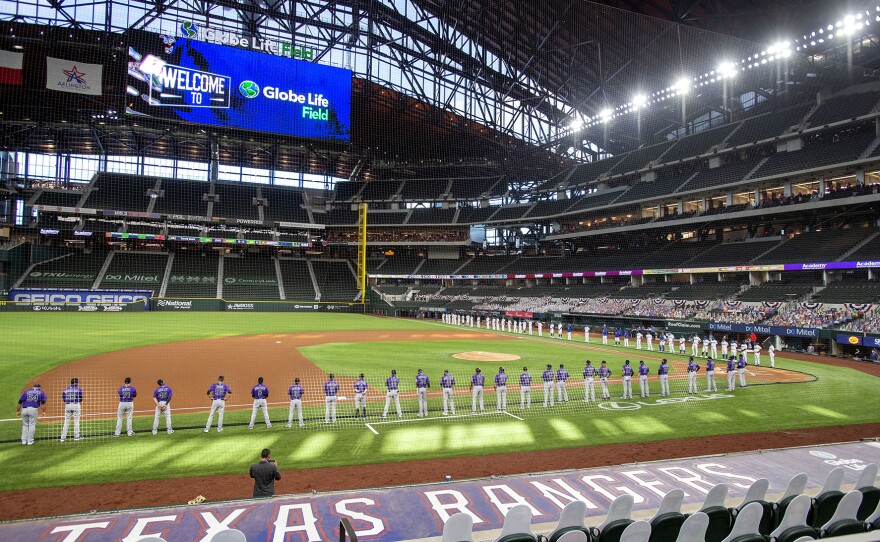The Texas Rangers could have a full house for their home opener next month after opening their new 40,518-seat stadium without fans in the stands for their games last season.
If that happens, the Rangers could be the first team in Major League Baseball or any major U.S.-based sports league to have a full-capacity crowd since the coronavirus pandemic started rapidly shutting down sports a year ago this week.
On the same day that Texas Gov. Greg Abbott's order took effect allowing businesses in the state to operate at 100% capacity, Rangers president of business operations and CEO Neil Leibman said Wednesday that the team hopes to be at that for the April 5 opener against the Toronto Blue Jays.
Local officials would be able to impose “mitigation strategies,” such as reduced capacity, if virus hospitalizations exceed 15% of all hospital capacity in their region over certain periods.
Even with his order, Abbott has encouraged the public to continue practicing social distancing measures and wearing masks, though they are no longer mandated.
The Rangers will still require fans to wear masks for games, unless they are actively eating and drinking at their seats, as was the case for postseason MLB games played at their $1.2 billion stadium last October.
Leibman, who is part of the team's ownership group, said MLB allows teams to operate under local capacity policy, as long as adequate protection for players is in place. The Rangers are installing plexiglass barriers on top of the dugouts and along the back and sides of the bullpens.
After the Rangers played all 30 of their home games during the pandemic-shortened 2020 season without fans, MLB allowed about 28% capacity at the retractable-roof stadium for the National League Championship Series and World Series that were played there exclusively. Abbott was on hand for the World Series opener, where he got to deliver the “Play Ball!” message before a crowd of 11,388.
All concession and merchandising transactions this season will be cashless, tickets will be digital and the roof will remain open during games when weather permits. The team will enforce social distancing for fans entering and exiting the ballpark, as well as when in lines for concessions or merchandise. No tailgating will be allowed outside the stadium.
“We’re very confident we won’t be a super-spreader event,” Leibman said. “With all the protocols that we’re following, we’ll be extremely responsible and provide a very comfortable environment for somebody to enjoy the game without worrying we’re going to be a spreader event.”
Rob Matwick, the team's executive vice president, stressed the need for fans to voluntarily comply with any requirements, but said they will be enforced when necessary.
“We will need fan cooperation, there’s no doubt. The good news is the numbers are trending down,” Matwick said. "Can we drop our vigilance? No. We need their cooperation.”
The Rangers plan to create “distanced seating” sections in certain locations of the stadium, with more space between occupied seats for all games after the home opener.
Texas had been allowing some fans at sporting events, from high schools all the way through the top professional leagues, since last summer and most teams and leagues have kept attendance at sharply reduced levels. The Rangers' stadium hosted about 50 high school graduation ceremonies last summer, the Wrangler National Finals Rodeo in December and a college baseball tournament last month.





